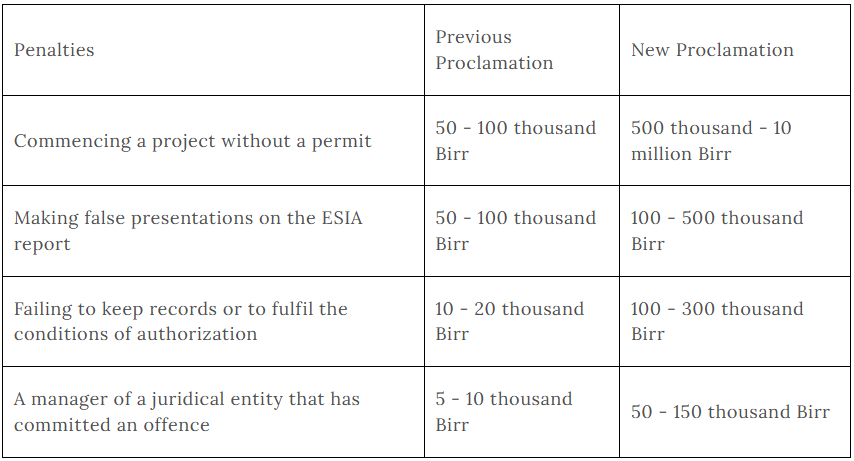Ethiopia enacted the Environmental and Social Impact Assessment Proclamation No. 1317/2025 (the “New Proclamation”), replacing the Environmental Impact Assessment Proclamation No. 299/2002 (the “Previous Proclamation”). The New Proclamation aims to modernise and strengthen the environmental assessment framework to reflect the country’s evolving development priorities, align with international best practices, and integrate broader social considerations into development planning. This update outlines the key changes and compliance obligations.
Expanded Scope
Unlike the Previous Proclamation, which focused primarily on environmental impacts, the New Proclamation broadens the scope to include social, economic, and cultural considerations. While the earlier framework defined environmental impact assessment narrowly—as a process for identifying potential environmental harm before project approval—the New Proclamation adopts a more integrated approach. It incorporates assessments of impacts on social structures, community organization, and ways of life.
Compliance Requirements
An Environmental and Social Impact Assessment (ESIA) clearance certificate is a mandatory precondition for implementing any project falling under categories to be specified by future directives. Such projects must secure prior approval from either the Ethiopian Environmental Protection Authority (the “Authority”) or the relevant Regional Environmental Agency (“Regional Agency”). Key regulators—including the Ethiopian Investment Commission, the Ministry of Trade and Regional Integration, and the Petroleum and Energy Authority— must a valid ESIA certificate from the Authority or Regional Agency before issuing or renewing licenses in their respective sectors.
Only licensed professionals accredited by the Authority may conduct ESIA studies. Consultants must meet specified academic and experience-based criteria, as set out in the relevant Directive. The ESIA study must cover technical, environmental, social, and transboundary impacts, propose mitigation measures, and reflect meaningful public consultations. Public engagement is mandatory. Project proponents must hold meetings, collect community input, and incorporate the feedback into the final report, which the Authority or a Regional Agency must approve before project commencement.
Environmental and Social Audit
A new compliance requirement introduced by the New Proclamation is the Environmental and Social Audit—a periodic review to verify compliance with the approved ESIA. The Authority or the Regional Agency must conduct such audits at least once every two years. When conducted federally, the Authority must coordinate with the relevant regional body. Audit reports must include:
- Implementation status of the environmental management plan,
- Energy and waste data,
- Budget allocations for environmental measures,
- Staffing for environmental oversight,
- Records of previous audits and submissions.
Project owners may also conduct their audits using licensed professionals. These reports must be submitted during clearance renewal, along with documentation of corrective actions taken.
Review Timeline
Under the Previous Proclamation, the Authority or the Regional Agency was required to review and decide on the ESIA report within 15 working days. The New Proclamation extends this review period to 45 working days. Moreover, it allows the Authority or the Regional Agency to exceed this timeframe when the nature, complexity, or scale of the project justifies additional time.
Annual Renewals and Ongoing Obligations
The New Proclamation eliminates fixed validity periods and introduces mandatory annual renewals for all ESIA clearance certificates. Project developers must also update and submit their environmental and social management plans every three years. These changes impose a continuous compliance obligation on all project owners.
Penalties
The New Proclamation introduces a revised penalty regime. Notably, it allows administrative action against public institutions initiating projects without prior clearance. Further, any project implemented without an ESIA will not only be subject to applicable criminal and civil liability but also to administrative measures imposed by the Authority or the Regional Agency, in line with directives to be issued.
The New Proclamation has revised the penalty regime as follows:

Existing Projects
Existing projects that did not undergo an ESIA but would be required to under the new framework must submit an environmental and social management plan within one year (by April 11, 2026), for review and approval by the Authority or Regional Agency.
Future Directives
While the New Proclamation establishes the foundational legal framework for ESIA in Ethiopia, several key elements are expected to be further elaborated through implementing directives and technical guidelines to be issued by the relevant authorities. Areas to be addressed include:
- Lists of projects subject to ESIA,
- Evaluation criteria for ESIA reports,
- Procedures for timeline extensions,
- Permit renewal guidelines,
- Environmental and Social Management Plan review standards,
- Requirements for public participation,
- Enforcement and non-compliance mechanisms,
- ESIA requirements for public policies and strategies.
Conclusion
Marking the shift from “Environmental Impact Assessment” to “Environmental and Social Impact Assessment,” the new law introduces a set of expanded compliance obligations for project developers and owners. These include: annual renewal of ESIA clearance certificates; updating Environmental and Social Management Plans (ESMPs) every three years; undergoing audits at least once every two years by the relevant authorities; conducting and documenting meaningful public consultations; and implementing mitigation measures that address both environmental and social risks. Failure to comply with these obligations may result in delays to project implementation, suspension of approvals, or legal liability. The New Proclamation, therefore, signals a more rigorous regulatory environment—one that demands proactive planning, continuous oversight, and sustained stakeholder engagement.
For more information, contact
Eskedar Ezezew - eskedar@mekdesmezgebu.com
Salem Wondyfraw - salem@mekdesmezgebu.com
--
Read the original publication at Mekdes & Associates




